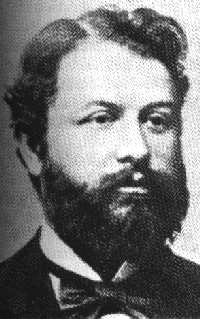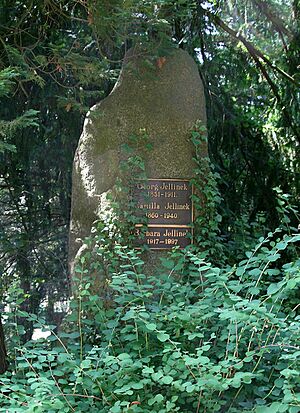Georg Jellinek facts for kids
Quick facts for kids
Georg Jellinek
|
|
|---|---|

Georg Jellinek
|
|
| Born | 16 June 1851 |
| Died | 12 January 1911 (aged 59) |
| Occupation | Jurist |
Georg Jellinek (June 16, 1851 – January 12, 1911) was a famous German expert in public law. He was known as a leading figure in public law in Austria. Public law deals with how the government works and how it interacts with people.
Contents
Georg Jellinek's Life and Work
Georg Jellinek began his studies in 1867 at the University of Vienna. He studied law, history of art, and philosophy. He also continued his studies in Heidelberg and Leipzig until 1872. His father, Adolf Jellinek, was a well-known preacher in Vienna's Jewish community.
In 1872, Georg finished his first university degree (called a Dr. phil.) in Leipzig. His paper was about the social meaning of justice and punishment. In 1874, he earned another degree (a Dr. jur.) in Vienna.
Becoming a Professor
In 1879, Jellinek became qualified to teach as a professor at the University of Vienna. He taught about the philosophy of law. In 1881, he joined a special group that oversaw state exams. A year later, he published an important book called The Theory of the Unifications of States (1882).
In 1883, he became a professor of Public Law at the University of Vienna. Later, in 1889, he became a full professor in Basel, Switzerland. He then left his teaching job in Austria-Hungary.
From 1891, Jellinek was a full professor for general Public Law and International Law at the University of Heidelberg in Germany. In 1900, he wrote his most important work, General Theory of the State. In 1907, he became the first Jewish leader (called a rector) of Heidelberg University.
Family Life
Georg Jellinek was married to Camilla Jellinek (1860–1940). She became involved in the Women's Movement in 1900. Camilla was famous for helping women with legal problems and suggesting changes to criminal laws.
Georg and Camilla had six children. Four of them lived to adulthood. Their son Walter also became a law professor. He helped publish a final version of his father's book, General Theory of the State, after Georg passed away. Their daughter Dora survived a difficult time in a concentration camp. Their youngest son, Otto, sadly died in 1943 due to abuse.
Ideas on Human Rights
Jellinek is especially known for his essay The Declaration of the Rights of Man and the Citizen (1895). In this essay, he argued for a worldwide idea of human rights. He believed that rights should apply to everyone, not just specific cultures or countries.
He thought that the French Revolution, a major event in the 19th century, was not just a French idea. Instead, he saw it as similar to revolutionary movements and ideas in England and the United States. He believed that the idea of human rights was a universal concept, meaning it applies to all people everywhere.
Writings
Most of Georg Jellinek's writings are still in their original German language. Some of his important works include:
- The Worldviews of Leibnitz and Schopenhauer (1872)
- The Theory of the Unifications of States (1882)
- The Legal Nature of State Treaties (1880)
- General Theory of the State (1900)
See also
 In Spanish: Georg Jellinek para niños
In Spanish: Georg Jellinek para niños
 | Georgia Louise Harris Brown |
 | Julian Abele |
 | Norma Merrick Sklarek |
 | William Sidney Pittman |


